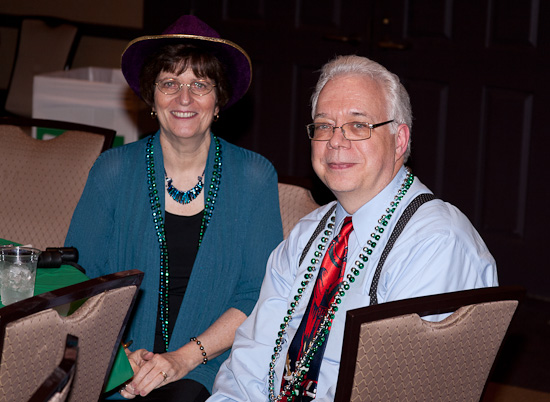
"Indeed, God did not send the Son into the world to condemn the world, but in order that the world might be saved through him." (John 3:17)
Prime Timers is a Christian Education group at St. Martin's for Episcopalians aged fifty and above. We are following a course of study based on the Revised Common Lectionary, the three year cycle of Bible readings used throughout the Anglican Communion and by many Protestant denominations worldwide. Next week's readings are right here, at the bottom of the page! You are invited to join us in the Parlor near the church offices, Sunday after the 9:00am service, 10:15am to 11:00.
The Shrove Tuesday Pancake Supper!

St. Martin's Annual Shrove Tuesday Pancake Supper launches us into Lent with a bang, and a juggler!

Talented youngsters sang!

Seekers Class turned Rev. Ron Morris (in the yellow hat) into Aldo the Adequate!

What else can you say?

A night for all God's children

And the award goes to...

...the Young People

Prime Timers Annette and Murray resting after filling their roles as Greeters and Servers!

More clowns!

Even the Gorilla was excited!
Prime Timers Good News
The Prime Timers hear members Good News each week at the start of class. We charge a dollar and currently donate the money collected to the Amistad Mission in Bolivia.
Jesus Temptation
Carol Harland leads the class today, the first Sunday in Lent. Carol tells us she is surprised that the story of Jesus temptations on the mountain is the traditional first reading. The story in Matthew 4:1-11 has Jesus tempted three times. Remember Jesus has fasted for forty days and nights and must be famished and vulnerable. The first temptation is of the body. "If you are the Son of God, command these stones to become loaves of bread" (Matthew 4:3) Class member George points out that while people can live for quite a while with no food, without water we die within days. So Jesus already shows signs that he is more than human. Severe fasting brings on hallucinations, yet Jesus has the presence of mind to tell the tempter "One does not live by bread alone, but by every word that comes from the mouth of God" (Matthew 4:4).
Carol tells us she has a hard time seeing evil as a person, thinking more in terms of personal temptations and how evil is presented in our lives. Others in the class suggest Muammar Gaddafi bombing his own people as an example of evil incarnate. The devil, meanwhile, tests Jesus by suggesting he jump off the mountain to show his divinity. The devil quotes Psalm 91:11-12 "For he will command his angels concerning you to guard you in all your ways. 12On their hands they will bear you up, so that you will not dash your foot against a stone." Jesus responds with a passage from Deuteronomy 6:16 "Do not put the Lord your God to the test, as you tested him at Massah." This refers to the people challenging Moses in the desert and Moses bringing water from the rock at Horeb in Exodus 17:1-7.
Finally the tempter offers Jesus all the kingdoms of the world, if only Jesus will fall down and worship the devil. George wonders, "who would want to have that kind of responsibility! The headaches, the problems." Of course it is all about power in this example and Jesus casts out the devil, paraphrasing Deuteronomy 6:13 "The Lord your God you shall fear; him you shall serve, and by his name alone you shall swear."
Balancing Jesus temptations, the Old Testament reading is about the very first temptation, Adam and Eve in Genesis 2. Later in Paul's letter to the Romans this parallel is expounded upon. To Paul, everyone sinned and this is what separates us from God. It is through the reconciliation made possible through Jesus Christ that we become whole.
Back to the rocks into bread, Marty mentions how this would be an act of pure magic. George mentions a story from a Bible class where turning water into wine is actually a natural process! Grapes are watered and nurtured, finally being harvested and fermented and ultimately becoming wine. Jesus simply sped up the process!!! Another class member draws the distinction that Jesus' miracles are for the benefit of others and not for himself. After all, ultimately he will die for us.
Class is asked about our own temptations and we all allow that resisting temptation makes us better people. George sums it up with his story about the white dog and the black dog. In each of us is a white dog and a black dog. The black dog is of course the evil and bad things about us. We need to literally starve the black dog to death to become good Christians, and this can take a lifetime.
From our class notes: At the very beginning of her novel Memento Mori, novelist Muriel Spark introduces the common predicament in which all
people ultimately find themselves, death. Dame Lettie Colson is
writing a letter when the telephone rings. A man, the same man
who has called her eight other times in the past six weeks, speaks
abruptly. All he says is, "Remember you must die." All the old
people in the story receive the same message.
Lent is about our death—"Memento mori: remember you
must die." Six weeks of reflection on our predicament would be
too much for us to bear—as it was for most of the old people in
Muriel Spark's story—were it not for the facts of Jesus' Resurrection
and our Baptism into his death and life (Rom. 6:3-5). We
have already died a little death in the waters of Baptism; but we
are to reflect on that during Lent in the knowledge that nothing
will be able to separate us from the love of God in Christ Jesus
our Lord (Rom. 8:39).
Carol concludes class with a short prayer.
Lectionary readings
The Readings for Sunday, March 20th are from Lectionary Year One, Lent 2-A, "Right Relationship with God"
The Readings for this week are Genesis 12:1-4a; Psalm 121; Romans 4:1-5, 13-17 and John 3:1-17. The text this week is from the New Revised Standard Version.
1Now the Lord said to Abram, 'Go from your country and your kindred and your father's house to the land that I will show you. 2I will make of you a great nation, and I will bless you, and make your name great, so that you will be a blessing. 3I will bless those who bless you, and the one who curses you I will curse; and in you all the families of the earth shall be blessed.'
4 So Abram went, as the Lord had told him; and Lot went with him.
A Song of Ascents.
1 I lift up my eyes to the hills—
from where will my help come?
2 My help comes from the Lord,
who made heaven and earth.
3 He will not let your foot be moved;
he who keeps you will not slumber.
4 He who keeps Israel
will neither slumber nor sleep.
5 The Lord is your keeper;
the Lord is your shade at your right hand.
6 The sun shall not strike you by day,
nor the moon by night.
7 The Lord will keep you from all evil;
he will keep your life.
8 The Lord will keep
your going out and your coming in
from this time on and for evermore.
1What then are we to say was gained by Abraham, our ancestor according to the flesh? 2For if Abraham was justified by works, he has something to boast about, but not before God. 3For what does the scripture say? 'Abraham believed God, and it was reckoned to him as righteousness.' 4Now to one who works, wages are not reckoned as a gift but as something due. 5But to one who without works trusts him who justifies the ungodly, such faith is reckoned as righteousness.
13 For the promise that he would inherit the world did not come to Abraham or to his descendants through the law but through the righteousness of faith. 14If it is the adherents of the law who are to be the heirs, faith is null and the promise is void. 15For the law brings wrath; but where there is no law, neither is there violation.
16 For this reason it depends on faith, in order that the promise may rest on grace and be guaranteed to all his descendants, not only to the adherents of the law but also to those who share the faith of Abraham (for he is the father of all of us, 17as it is written, 'I have made you the father of many nations')—in the presence of the God in whom he believed, who gives life to the dead and calls into existence the things that do not exist.
1Now there was a Pharisee named Nicodemus, a leader of the Jews. 2He came to Jesus by night and said to him, 'Rabbi, we know that you are a teacher who has come from God; for no one can do these signs that you do apart from the presence of God.' 3Jesus answered him, 'Very truly, I tell you, no one can see the kingdom of God without being born from above.' 4Nicodemus said to him, 'How can anyone be born after having grown old? Can one enter a second time into the mother's womb and be born?' 5Jesus answered, 'Very truly, I tell you, no one can enter the kingdom of God without being born of water and Spirit. 6What is born of the flesh is flesh, and what is born of the Spirit is spirit. 7Do not be astonished that I said to you, "You must be born from above." 8The wind blows where it chooses, and you hear the sound of it, but you do not know where it comes from or where it goes. So it is with everyone who is born of the Spirit.' 9Nicodemus said to him, 'How can these things be?' 10Jesus answered him, 'Are you a teacher of Israel, and yet you do not understand these things?
11 'Very truly, I tell you, we speak of what we know and testify to what we have seen; yet you do not receive our testimony. 12If I have told you about earthly things and you do not believe, how can you believe if I tell you about heavenly things? 13No one has ascended into heaven except the one who descended from heaven, the Son of Man. 14And just as Moses lifted up the serpent in the wilderness, so must the Son of Man be lifted up, 15that whoever believes in him may have eternal life.
16 'For God so loved the world that he gave his only Son, so that everyone who believes in him may not perish but may have eternal life.
17 'Indeed, God did not send the Son into the world to condemn the world, but in order that the world might be saved through him...'
NRSV



